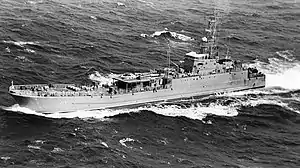| Andaman and Nicobar Command | |
|---|---|
| Founded | September 2001 |
| Country | |
| Type | Tri-Service Command |
| Headquarters | Port Blair |
| Commanders | |
| Commander-in-Chief, Andaman and Nicobar Command | Air Marshal Saju Balakrishnan |
The Andaman and Nicobar Command (ANC) is the only tri-service theater command of the Indian Armed Forces, based at Port Blair in the Andaman and Nicobar Islands, a Union Territory of India.[1] It was created in 2001 to safeguard India's strategic interests in Southeast Asia and the Strait of Malacca by increasing rapid deployment of military assets in the region. It provides logistical and administrative support to naval ships which are sent on deployment to East Asia and the Pacific Ocean.[2][3][4]
Background
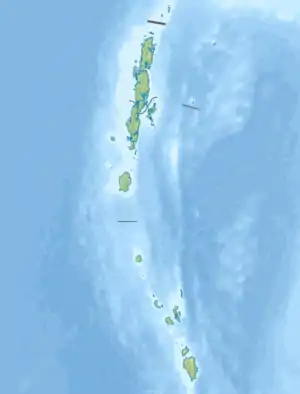
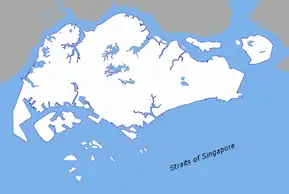
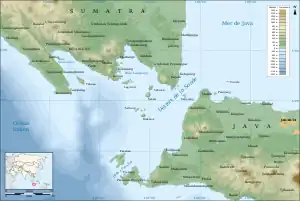
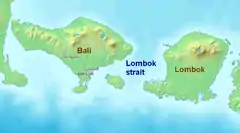
Strategic Importance of ANC
According to the International Hydrographic Organization's (IHO) definitions of the Bay of Bengal and Andaman Sea, the Andaman and Nicobar Islands (A&N) fall on the maritime boundary of these two. Indian exclusive economic zone (EEZ) to the north and west of A&N falls within the Bay of Bengal and to east of A&N falls within the Andaman Sea. Various straits (narrow passage in the sea, also called the channel) in A&N, are officially part of Andaman Sea and not the Bay of Bengal, connect the Bay of Bengal with Andaman Sea and to the shipping routes beyond. The Ten Degree Channel (also called Great or Grand Channel) within India's EEZ is world's busiest shipping trade route which also connects to very narrow and contiguous Malacca and Singapore straits. This route is considered world's biggest strategic chokepoint in military terminology, e.g. India and allies could potentially impose a blockade in case of dispute with China whose economy significantly depends on the export trade through this route. Safety, security and freedom of navigation in this area is vital for the global economy. This area is part of the much larger Indian Ocean region through which 90% of the world's trade passes, which in turn is part of the larger Indo-Pacific region which hosts most of the global maritime trading activity.
Control over vital global shipping route
The zone of influence of ANC has deep significance in terms of history, culture, religion, economy and trade, EEZs, political and international relations, national security, safety and freedom of navigation of power projection of not only India but also other nations of South Asia and Southeast Asia as well as $3 trillion international trade which passes through south Andaman Sea. ANC influence over the gateway of Far East includes Six Degree Channel and Ten Degree Channel in Indian EEZ in Bay of Bengal, which is connected to the Strait of Malacca. These are crossed by over 94,000 merchant ships every year carrying world's 40% freight trade to and from China, South Korea and Japan. Andaman and Nicobar Islands account for 0.2% of India's land and 30% of its exclusive economic zone.[5][6] Sea lines of communication (SLOC) carry more than 90% of global trade.[7] In Indo-Pacific Asia, US$5 trillion annual shipping trade passes through the SLOC and chokepoints of Southeast Asia and South China Sea (SCS).[7] 80% of the global trade passes through Indian Ocean SLOC in oil and natural gas critical for advanced economies.[7]
Control over critical shipping chokepoints
Since this area in Indian EEZ and ANC influence zone connects Indian Ocean with South China Sea and Pacific Ocean, the safety of Malacca strait is paramount to the economies of numerous countries.[8] Both USA and Russia support the freedom of navigation.[9] Australia's "2013 Defence White Paper" emphasises importance of security of Indian Ocean SLOC trade which has surpassed Atlantic and Pacific oceans trade.[10] However, China's activities in this region continues cause concern among several nations.[8] Against the concern shown by United States, Japan and several other nations, China continues to claim most of South China Sea.[11] China has militarized a reclaimed tiny islet in South China Sea which is also claimed by other nations.[11] This has led to China's conflict with several Southeast Asian nations, including Philippines and Vietnam.[11] In March 2020, Indian Navy discovered 12 underwater drones deployed by China in Indian Ocean for gathering oceanographic naval intelligence aimed at submarine warfare.[10][8] China has allegedly done the similar underwater drone operation in Pacific Ocean as well.[10][8]
All 3 major global sea trade routes to Indian Ocean, from Cape of Good Hope and Gulf of Aden or Straits of Hormuz, converge at narrow Six Degree Channel in Indian EEZ resulting in high shipping density, which enhances India's ability to exert influence over the vulnerability and protection of this maritime trade route.[9] Shallow, congested and narrow archipelagic chokepoints in the influence zone of ANC are Straits of Malacca and Lombok Strait to and from South China Sea.[6] Malaca strait is the busiest and most important chokepoint.[8][12][6] All trade vessels from Malacca Strait must pass through most important SLOC chokepoint located within India's Anadaman Nicobar EEZ, i.e. Six Degree Channel south of Anadaman and Nicobar Islands.[5] Other two less frequently used channels within Indian EEZ are the Preparis Channel in north and the Ten Degree Channel between the Andaman and Nicobar island groups.[5] Alternative to the shorter and busiest route through Malaca Strait and Six Degree Channel in Indian EEZ, guarded by Indian Military Base in Andaman and Nicobar Islands, is Sunda and Lombok Straits chokepoints in Indonesia in the influence zone of Cocos (Keeling) Islands Australian Military Base.[13] Together, these chokepoints are the entry and exit points between Indian and Pacific Oceans, all of which lie within combined India-Australia military influence zone.[13] This provides geostrategic advantage to Indian and Australian militaries [part of QUAD along with USA and Japan] for joint anti-signal intelligence gathering, submarine tracking and warfare missions in Indian and Pacific Oceans.[13]
India is bolstering military capabilities in Andaman and Nicobar Islands by placing ship-based nuclear missile system as deterrence and a fleet of naval warships with Landing Platform Docks (LPDs) by 2020.[5][14]
QUAD force multiplier
The Quadrilateral Security Dialogue (QUAD), a strategic dialogue between Australia, India, Japan and USA, is aimed at countering the risk posed to the trade and security of navigation and nations in and around this region.[15][16][17] QUAD nations continue to hold regular military exercise in the ANC influence area, such as Exercise Malabar (see also US-Philippines Annual Balikatan Exercise).[18][19]
Aimed at countering China's activities in Indo-Pacific, to ensure "free, open, inclusive and rules-based Indo-Pacific region ... and maintaining open, safe and efficient sea lanes for transportation and communication", India and Australia signed a military treaty for Mutual Logistics Support and interoperability for reciprocal access to military bases.[11] India has a similar treaty with U.S, while similar treaty with remaining member of QUAD, Japan, is awaited.[11] India, which also has MoU with USA and Japan for encrypted military communications, is likely to sign similar MoU with Australia.[11] India, USA and Japan have been undertaking regular trilateral maritime exercises (Exercise Malabar), which Australia is also expected to join.[11] India-Australia Military Pact paves the way for extending their regional reach through coordinated power projection and mutual use of military facilities in India's Andaman and Nicobar Islands and Australia's Cocos Island.[10] Australia, which already has RAAF base at Cocos Islands, uses it for surveillance and to monitor the area extending between Andaman and Nicobar Islands in the north to Cocos Islands in south.[10]
India-Singapore Bilateral Agreement for Navy Cooperation also provides Indian Navy ships access to Singapore's Changi Naval Base, logistical support and refuelling rights. This allows India, which has similar agreements with Vietnam, Japan, France, Australia and the United States, to counter China's "string of pearls" with "Necklace of Diamonds" ports: Changi Naval Base in Singapore, Chabahar Port in Iran, the Assumption Island in Seychelles, and Duqm Port in Oman.[20]
Historic and contemporary geostrategic soft and hard power
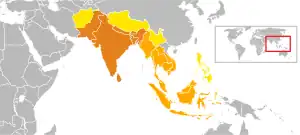
The area in and around ANC influence zone is part of historic Greater India which was dotted with numerous Indianised Hindu-Buddhist kingdoms. Since 45-47 CE, several ancient Indian empires, such as the Chola, Chalukya, Kalinga [modern Odisha] and Andra traded and exerted Indian cultural influence over Southeast Asia through the Malacca Strait.[8] From the 16th to 20th century, colonial western powers fought against each other for control of this maritime route, trade and the region.[8]
The 750-km long Andaman and Nicobar archipelago consists of a chain of 572 islands.[21] It is located about 1200 km from mainland India, merely 40 km from Myanmar, 160 km from Indonesia and 550 km from Thailand.[21] India's Landfall Island is 40 km from Myanmar's Coco Islands. India's southernmost territory Indira Point is 135 km north of Indonesia's northernmost territory Rondo Island.[22][23] India's Tillangchong island (north of Camorta Island in Nicobar) is just 440 km from Thailand's Ko Huyong (Similan Islands group). India's Campbell Bay on Great Nicobar Island is 488 km from Thailand's Ko Racha (Racha Noi Island in Phuket Province). Campbell Bay is also 630 km from Malaysia's nearest island ,Langkawi.
Port-development led encirclement
To enhance regional connectivity, trade, safety, security, and to protect the Strait of Malacca channel,[24] India is developing several strategic ports in the influence zone of ANC, namely the Port of Chittagong in Bangladesh with rail connectivity to Tripura,[25] Port of Mongla in Bangladesh,[25] Sittwe Port as part of the Kaladan Multi-Modal Transit Transport Project in Myanmar and[26][27] Sabang deepsea port under the India–Indonesia strategic military and economic partnership.[24] Along with India's Sagar Mala projects aimed at developing several coastal ports in India, India is also considering developing more ports in the influence zone of ANC, such as the Dawei Port Project.
Protection of exclusive economic zone
The region suffers from the problem of piracy.[6] ANC is guarantor of the safety and security of exclusive economic zone of India, which also lies in the vicinity of EEZs of several other nations including Indonesia, Malaysia, Thailand, Myanmar, Bangladesh, Maldives and Sri Lanka.
History of ANC
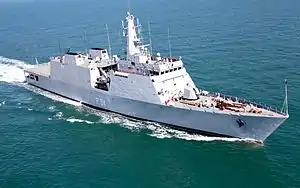
Inception and slow expansion
The island chain had remained underdeveloped because of multiple factors including lack of inter-island connectivity, distance from the Indian mainland and high-cost of building materials. In the 1960s, the Indian security establishment responded to the increased security threats and established a unified Fortress Andaman and Nicobar (FORTAN) under the command of a Vice Admiral as the Fortress Commander. The Indian Army initially placed a battalion and subsequently the 108 Mountain Brigade, in 1990, under the command of the Fortress Commander. The Indian Air Force chose to keep its units under one of its mainland commands and maintained a liaison with the FORTAN headquarters. 37 Wing of the Indian Air Force was raised at AFS Car Nicobar in 1993.[21]
There was a consideration to replace Fortress Commander, Andaman and Nicobar Islands (FORTAN) with a Far Eastern Naval Command (FENC). The previous plan to set up FENC was set in motion in 1995 following a closed-door meeting in Washington between then Prime Minister of India, P. V. Narasimha Rao, and then US president, Bill Clinton. At the time, Pentagon officials made a formal request to the United Front coalition government in New Delhi to open a base in the islands.[28]
Post Kargil war rapid capabilities expansion
In 1999, after the Kargil War, the Andaman and Nicobar Islands received more attention.[21] The Group of Ministers (GoM) report on Reforming the National Security System recommended the replacement of the FORTAN, under the Indian Navy, with a Joint Andaman and Nicobar Command which will control the assets of the tri-services and the Coast Guard on the islands. The GoM had recommended that the Commander of this Joint Command would report to the proposed Chief of Defence Staff (CDS). The Andaman and Nicobar Command was in place by the end of September 2001 and Vice Admiral (later Admiral and CNS) Arun Prakash was the first Commander–in–Chief of the Andaman & Nicobar Command (CINCAN).[2][29][30] A joint command at the Andaman and Nicobar Islands would help in to prevent smuggling, piracy, drug and gun trafficking, poaching and illegal immigration in the region and especially in the Malacca Strait. The command would also be in a position to assist the multinational Malacca Straits Security Initiative, aimed at curbing threats in the Malacca Straits.[3][31][32] An Indian command in the islands could also counter any future threat from China, which was rumoured to have set up a surveillance post in Myanmar's Coco Islands, 40 km off the northern tip of the Andamans, but this was proved incorrect.[33][34][35]
Summary of bases and capabilities
The following are the air and naval bases under the A&N command, from north to south, some of which are being upgraded under 2027 roll-on plan.[36][21] By 2020, India is placing ship-based nuclear missile system, fleet of naval warships and Landing Platform Docks (LPDs).[5][14]
| Base | Location | Airport[6] | Deepsea port[6] | Distance | Role | Upgrade[6] |
|---|---|---|---|---|---|---|
| Kalaikunda AFS | Kharagpur (West Bengal) | Yes | No (inland) | 1200 km to INS Kohassa | Air Force Base | |
| INS Kohassa | Shibpur village (Diglipur tehsil, North Andaman Island) | Yes (3000 ft, planned to be extended to 10,000 ft) | Aerial Bay jetty | 1200 km from Kalaikunda AFS | Naval Air Station | New ammunition dumps and capacity upgrade for fighter jets and bigger planes like long-range maritime reconnaissance Boeing P-8I and anti-submarine aircraft. |
| INS Jarawa | Port Blair (South Andaman Island) | At INS Utkarsh | Jetty | 180 km from INS Kohassa | Logistics and Administrative support naval base with jetty | |
| INS Utkrosh | Yes | INS Jarawa jetty | 180 km from INS Kohassa | Joint Naval and Air Force Base at Veer Savarkar International Airport | Naval ammunition depot and bigger reinforced command with extended jetties for aircraft carriers and large warships. | |
| Car Nicobar AFS | Car Nicobar | Yes | Jetty | 275 km from INS Utkrosh | Air Force Base | Capacity upgrade to hold fighter squadrons for more than month. |
| INS Kardip | Kamorta (Kamorta Island) | No | Jetty (upgraded to deepsea port for warships) | 144 km from Car Nicobar AFS | Logistics support for navy with extended jetty which can host larger cassels | |
| INS Baaz | Campbell Bay (Great Nicobar Island) | 3000 ft (extended to 6,000 feet) | Jetty (upgraed to deepsea port for warships, installation of a robust radar network. | 130 km from INS Kardip | Naval Air Station | New ammunition dump and relocating fighter jets and bigger planes such as long-range maritime reconnaissance Boeing P-8I and anti-submarine aircraft. |
Force structure
Commander-in-Chief, Andaman and Nicobar Command
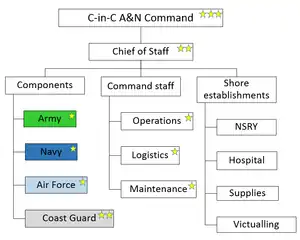
The Andaman and Nicobar Command is commanded by a Three-star officer (rank of Lieutenant General of the Indian Army or equivalent) who reports directly to the Chairman of the Chiefs of Staff Committee (Chairman COSC) or CDS (Chief of Defense Staff) in New Delhi. The Chief of Staff of the command is a two-star officer; each component (sea, land, air) is commanded by a one-star officer.[37][38][39] The command is currently headed by Air Marshal Saju Balakrishnan, who took command on 1 May 2023 as the 17th CINCAN.[40]
Chief of Staff
The following is a list of Chiefs of Staff of the A&N command.
| No | Name | Branch | Appointment Date | Left Office | References |
|---|---|---|---|---|---|
| 1 | Major General K. B. Kapoor VSM | 12 December 2001 | 14 October 2003 | ||
| 2 | Rear Admiral R. Kala NM | 15 October 2003 | 24 April 2005 | ||
| 3 | Rear Admiral S. Chakraborty VSM | 25 April 2005 | 6 June 2005 | ||
| 4 | Air Vice Marshal K. K. Nohwar VM | 7 June 2005 | 7 December 2006 | [41] | |
| 5 | Rear Admiral P. K. Nair | 8 December 2006 | 30 November 2008 | [42] | |
| 6 | Major General A. K. Chaturvedi | 1 December 2008 | 26 April 2010 | [43] | |
| 7 | Major General N. P. Padhi | 27 April 2010 | 6 May 2011 | [44] | |
| 8 | Rear Admiral Karambir Singh | 7 May 2011 | 28 May 2012 | [45][46] | |
| 9 | Rear Admiral Sudhir Pillai NM | 28 May 2012 | 4 July 2014 | [47][46] | |
| 10 | Major General C. E. Fernandes SM | 5 July 2014 | 14 October 2014 | [48] | |
| 11 | Major General P. K. Siwach VSM | 3 November 2014 | 30 March 2016 | [49] | |
| 12 | Major General P. S. Saj | 18 April 2016 | 4 May 2018 | ||
| 13 | Major General Beji Mathews | 5 May 2018 | 4 March 2020 | [50][51] | |
| 14 | Rear Admiral Suraj Berry AVSM, NM, VSM | 5 March 2020 | 17 July 2021 | [52] | |
| 15 | Rear Admiral Dalbir Singh Gujral NM | 18 July 2021 | 30 November 2022 | [53] | |
| 16 | Rear Admiral Sandeep Sandhu NM | 1 December 2022 | Incumbent | [54] |
Assets

The Naval Component is the largest component and is commanded by a Commodore (one star officer). Naval vessels in the component include missile corvettes, amphibious warfare vessels, landing crafts, offshore patrol vessels (OPV) and fast attack crafts (FAC). INS Karmuk and INS Kulish, two Kora-class corvettes were re-based to Port Blair from Eastern Naval Command on 6 April 2016 and 21 December 2017 respectively.[55][56] INS Saryu and INS Sumedha, two Saryu-class patrol vessels, have been based at Port Blair since 2013.[57] In addition, four Bangaram-class patrol vessels, two Car Nicobar-class patrol vessels, one Trinkat-class patrol vessel, three Kumbhir-class tank landing ships, one Shardul-class tank landing ship, eight Mk. IV LCUs and the SDB Mk.3 large patrol craft are also deployed under the naval component.[58][59] INAS 318 with Dornier 228 and Flight 321 are deployed at INS Utkrosh.[21]
The 108 Infantry Brigade of the Indian Army, comprising three battalions, which includes the 21 Bihar, is deployed at Birchgunj in Port Blair under the army component. A Territorial Army battalion is also deployed at Campbell Bay.[60][61][21] Indian Airforce's 15 FBSU (forward base support units), comprising 153 Squadron and 4 Maritime Element, are deployed at Port Blair. 37 Air Wing, comprising Helicopters from 122 squadron and Dornier 228 from 151 squadron, are deployed at AFS Car Nicobar.[62][21]
The Andaman & Nicobar region of the Indian Coast Guard also falls under the purview of the command with RHQ and 745 squadron at Port Blair, DHQ 9 at Diglipur and DHQ 10 at Campbell Bay.[63][64][21] In July 2012, the navy commissioned INS Baaz, a naval air station which is located 300 nautical miles south of Port Blair and is the southernmost air station of the Indian Armed Forces.[58] INS Jarawa at Phoenix Bay in Port Blair is the support base for the ships and the main naval and air force establishment in Port Blair.
Modernization
In 2013, the navy proposed to station a nuclear submarine and a landing deck platform at the islands in the future, and the Indian Air Force has decided to station Sukhoi Su-30MKI fighters on the islands along with increasing the number of operational airfields. The Air Force also maintains an Air Defense Wing fielding a squadron of S-75 Dvina Long-Range SAMs and a squadron of S-125 Neva/Pechora Medium-range SAMs.[3] The army's single brigade is planned to be increased by deploying a division size force (about 15,000 troops) under the command.[4][65][66] In 2015, it was reported that under the overall "island development plan", which includes a new naval air station at Campbell Bay, the existing runways at Campbell Bay and Shibpur are to be extended, while more airstrips are proposed in the archipelago and more operational turn-around bases.[62] The number of naval vessels based in the island chain will increase to 32 before 2022.[67] In addition, Japanese war bunkers, constructed during Japanese occupation of the Andaman and Nicobar islands during the World War II, will be revived to bolster security.[68]
Operations

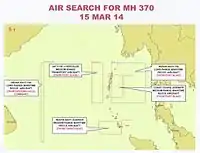
Unilateral security and anti-piracy initiatives
The Andaman and Nicobar Command manages Indian engagement with regional navies of Southeast Asia. It conducts bi-annual coordinated patrols (CORPATs) with the navies of Thailand and Indonesia, the annual SIMBEX maritime exercises with Singapore, and the biennial Milan multilateral naval exercises.[69][70][71] The Command also patrols India's exclusive economic zone to suppress gun running, narcotics smuggling, piracy, and poaching, and conducts maritime surveillance, humanitarian assistance and disaster relief.[72][73][74]
Unilateral war exercises
In April 2016, the command conducted an amphibious exercise called 'Jal Prahar' to check readiness and to ensure functional integrity of all three services on the islands. Ships, aircraft and troops along with tanks from both the Eastern Naval Command and Andaman & Nicobar Command participated in the exercise.[75] Defence of Andaman & Nicobar Islands Exercise (DANX-17) was conducted during 20–24 November 2017. Additional forces including Jaguar fighters, 50th Parachute Brigade, missile frigates and C-130 Hercules heavy lift aircraft also participated in the exercise. The purpose of the exercise was to practice the defence of the island chain and recapturing islands.[76]
Search for Malaysia Airlines Flight 370
For the effort to search for Malaysia Airlines Flight 370, the Commander-in-Chief Andaman and Nicobar Command was nominated as the Overall Force Commander of the Indian forces.[77] Surface and airborne assets from the Andaman and Nicobar Command took part in the effort. The ANC command contributed navy ships INS Saryu, INS Kesari and INS Kumbhir, and coast guard vessels ICGS Kanaklata Baruah, ICGS Bhikaji Cama and ICGS Sagar.[78][79][80] Eastern Naval Command (ENC) also contributed Shivalik-class frigates INS Satpura and INS Sahyadri, and patrol vessel INS Batti Malv.[81][82][83] For aerial maritime surveillance, the ANC command dedicated two navy Boeing P-8I Neptunes, coast guard Dornier 228, and Indian Air Force C-130J Super Hercules from Port Blair, and navy Dornier 228 from Car Nicobar.[77] along with air force Mil Mi-17 from ENC.[81][82][83]
See also
- Integrated entities
- Defence Planning Committee, tri-services command at policy level with NSA as its chief
- Defence Cyber Agency, tri-services command
- Integrated Defence Staff, tri-services command at strategic level composed of MoD, MEA and tri-services staff
- Armed Forces Special Operations Division, tri-services command at operational level
- Defence Space Agency, draws staff from all 3 services of Indian Armeed Forces
- Strategic Forces Command, nuclear command of India
- Indian Nuclear Command Authority, Strategic Forces Command
- Special Forces of India, tri-services, RAW and internal Security each has own units
- Assets
- List of Indian Air Force stations
- List of Indian Navy bases
- List of active Indian Navy ships
- India's overseas military bases
- Other nations
- Special Operations Forces Command (KSSO) - Russian equivalent command
- Joint Special Operations Command (JSOC) - U.S. equivalent command
- General concepts
- Joint warfare, general concept
- Credible minimum deterrence
- List of cyber warfare forces of other nations
References
- ↑ "How the Indian Navy can dominate the Indian Ocean". Rediff. 3 September 2012. Archived from the original on 11 November 2013. Retrieved 23 October 2013.
- 1 2 Prakash, Admiral (Retd) Arun (2007). "India's Higher Defence Organisation" (PDF). Journal of Defence Studies, Institute for Defence Studies and Analyses. 1 (1). Archived (PDF) from the original on 3 March 2016. Retrieved 1 March 2013.
- 1 2 3 "India To Establish 2 Additional Missile Test Sites". Defence News. 27 February 2013. Archived from the original on 8 April 2013. Retrieved 1 March 2013.
- 1 2 3 4 5 The Growing Strategic Importance of the Andaman and Nicobar Islands, Future Directions org, 15 JUNE 2017.
- 1 2 3 4 5 6 7 More muscle for India's Andaman and Nicobar defence posts to counter hawkish China, Hindustan Times, 26 Aug 2017.
- 1 2 3 Australia's own Indo-Pacific fortress – The case for redeveloping Cocos Islands, Defence Connect, 28 MAY 2019.
- 1 2 3 4 5 6 7 India's Strategic Dimensions in Malacca Strait By Vithiyapathy Purushothaman, 16 March 2015.
- 1 2 What is the geo-strategic potential of the Great Channel? How can it curtail the benefits of the Malacca Strait?, Institute for Defence Studies and Analysis.
- 1 2 3 4 5 India, Australia Could Sign Pact For A Military Base In Andaman's and Cocos Islands, Eurasian Times, 23 May 2020.
- 1 2 3 4 5 6 7 India and Australia sign military pact as China tensions rise, Asian Review, 4 June 2020.
- ↑ Bill Tarrant, 2010, Strait is a strategic 'chokepoint', retrieved 23 Jan 2015.
- 1 2 3 Islands of opportunity: Where India and Australia can work together, The Interpreter, 22 May 2020.
- 1 2 Ensuring Secure Seas: Indian Maritime Security Strategy, Ministry of Defence (Navy), 2015.
- ↑ Ching, Frank. "Asian Arc of Democracy" Archived 10 June 2015 at the Wayback Machine Korea Times, 24 February 2008.
- ↑ Twining, Daniel. "The new Asian order's challenge to China". Financial Times, 26 September 2007.
- ↑ Brooks, L., Busby, J. W., Denmark, A. M., Ford, L., Green, M. J., Ikenberry, G. J., Kaplan, R. D., Patel, N., Twining, D., and R. Weitz, 2009. "China's Arrival: A Strategic Framework for a Global Relationship". Eds. Abraham Denmark and Nirav Patel, Center for a New American Security.
- ↑ Diplomat, Franz-Stefan Gady, The. "India, US, and Japan to Hold 'Malabar' Naval War Games This Week". The Diplomat. Retrieved 5 June 2018.
{{cite web}}: CS1 maint: multiple names: authors list (link) - ↑ "Military Exercises –– Feb to Nov 2008". Archived from the original on 19 December 2008. Retrieved 5 July 2020.
- ↑ From Singapore's Changi Naval Base To Oman's Duqm Port, How Is India Countering Chinese String of Pearls?, Eurasian Times, 15 July 2020.
- 1 2 3 4 5 6 7 8 9 "Andaman and Nicobar Command – Google Search". www.google.com. Retrieved 27 December 2017.
- ↑ James Horsburgh, 1852, The India Directory, Or, Directions for Sailing to and from the East Indies, Page 63.
- ↑ "Rondo Island, The Rich Uninhabited Island". Archived from the original on 3 November 2012. Retrieved 5 July 2020.
- 1 2 Eyeing Southeast Asia, India builds port in Indonesia, Economic Times, 20 March 2019.
- 1 2 Bangladesh, India to ink pact today to allow N-E States use Chittagong port m The Hindu, 24 October 2018.
- ↑ Purushothaman, Vakkom. "Kaladan Multi Modal Transit Transport Project to link sea route in Myanmar with Mizoram". The Northeast Times. Archived from the original on 15 April 2012. Retrieved 11 August 2012.
- ↑ India starts construction of ₹1,600-cr Mizoram-Myanmar Kaladan road , Business Line, 17 April 2018.
- ↑ "India Bids to Rule the Waves: From the Bay of Bengal to the Malacca Strait". Japanfocus.org. Archived from the original on 16 July 2012. Retrieved 1 March 2013.
- ↑ Prakash, Admiral (Retd) Arun (2002). "Joint Andaman and Nicobar Command (ANC) and Defence of Our Island Territories (Part I)". USI Journal. CXXXlI. Archived from the original on 25 June 2010. Retrieved 1 March 2013.
- ↑ "Andaman and Nicobar Command". NIC. Archived from the original on 13 May 2013. Retrieved 1 July 2013.
- ↑ "Navy to have new command at Andamans". The Tribune. 11 January 1999. Archived from the original on 29 October 2013. Retrieved 1 March 2013.
- ↑ "Malacca strait". The Indian Express.
- ↑ V. Pant, Harsh (3 May 2010). "China's Naval Expansion in the Indian Ocean and India-China Rivalry". The Asia-Pacific Journal. Archived from the original on 22 February 2014. Retrieved 14 February 2014.
- ↑ "'China a strategic partner, not a threat'". Business Standard. 8 February 2014. Archived from the original on 22 February 2014. Retrieved 14 February 2014.
- ↑ Selth, Andrew (9 January 2007) "Irrawaddy: Chinese whispers: The Great Coco Island mystery" BurmaNet News Archived 23 February 2014 at the Wayback Machine
- ↑ "Andamans, not just an Indian mainland buffer". Frontier India. 3 August 2012. Archived from the original on 27 December 2017. Retrieved 18 March 2014.
- ↑ "Press Information Bureau". Pib.and.nic.in. Archived from the original on 21 April 2011. Retrieved 26 July 2010.
- ↑ "Andaman and Nicobar Islands: India's Strategic Outpost". Archived from the original on 19 March 2014.
- ↑ "Andaman and Nicobar to become a major amphibious warfare base". Archived from the original on 19 March 2014.
- ↑ @airnews_pb (1 May 2023). "Air Marshal Saju Balakrishnan takes over as CINCAN" (Tweet) – via Twitter.
- ↑ "Air Marshal KK Nohwar PVSM VM (Ret'd)" (PDF). capsindia.org. Retrieved 2 December 2022.
- ↑ "English Releases". pib.gov.in. Retrieved 2 December 2022.
- ↑ "Padhi takes over as Chief of Staff of Andaman Nicobar Command". news.webindia123.com. Retrieved 2 December 2022.
- ↑ "Padhi takes over as Chief of Staff of Andaman Nicobar Command". news.webindia123.com. Retrieved 2 December 2022.
- ↑ "ANC to Bid Farewell Rear Admiral Karambir Singh". ANDAMAN SHEEKHA. 28 May 2012. Retrieved 2 December 2022.
- 1 2 "Pillai new chief of Staff of Andaman Command". Hindustan Times. 29 May 2012. Retrieved 2 December 2022.
- ↑ "Rear Admiral Sudhir Pillai takes over as Chief Of Staff, Andaman and Nicobar Command". ANDAMAN SHEEKHA. 29 May 2012. Retrieved 2 December 2022.
- ↑ "Maj. Gen. CE Fernandes, SM, Takes Over as Chief of Staff". www.andamanchronicle.net. Retrieved 2 December 2022.
- ↑ "Army Day 2015: Andaman & Nicobar Command Holds Sainik Sammelan". www.andamanchronicle.net. Retrieved 2 December 2022.
- ↑ "ANC Celebrates Armed Forces Veteran's Day". ANDAMAN SHEEKHA. 14 January 2019.
- ↑ "Andaman and Nicobar Command Basketball Championship 2017-18". ANDAMAN SHEEKHA. 11 May 2018. Retrieved 2 December 2022.
- ↑ "Press Information Bureau". www.pib.gov.in. Retrieved 2 December 2022.
- ↑ "ANC Hands Over Victory flame to Eastern Naval Command - ANDAMAN SHEEKHA". ANDAMAN SHEEKHA. 29 August 2021. Retrieved 2 December 2022.
- ↑ Andaman & Nicobar Command [@AN_Command] (30 November 2022). "CINCAN congratulated RAdm Dalbir Gujral on culmination of an outstanding tenure as ANC COS with major contribution to ongoing integration enhancement. The experience he observed is apt for the move to HQ IDS. He also welcomed RAdm Sandeep Sandhu to Team ANC & wished him the best. https://t.co/OloEszEl70" (Tweet). Archived from the original on 2 December 2022. Retrieved 14 December 2022 – via Twitter.
- ↑ "Andaman islands get first missile Corvette". India Today. 6 April 2016. Archived from the original on 10 April 2016. Retrieved 6 April 2016.
- ↑ A. Bharat Bhushan Babu [@SpokespersonMoD] (22 December 2017). "INS Kulish a Kora Class missile corvette with an array of missiles and guns has joined the Naval Component of the Andaman and Nicobar Command in Port Blair on 21 December 2017 https://t.co/ueR71CtBzs" (Tweet). Archived from the original on 9 March 2021. Retrieved 14 December 2022 – via Twitter.
- ↑ "Navy ready to flex muscles in South China Sea". The Sunday Guardian. 4 December 2011. Archived from the original on 14 March 2014. Retrieved 23 October 2013.
- 1 2 "New Naval Air Station 'INS Baaz' commissioned by CNS". Indian Navy. Archived from the original on 29 January 2013. Retrieved 1 March 2013.
- ↑ "Andaman and Nicobar to become a major amphibious warfare base". DNA India. 8 February 2010. Archived from the original on 19 March 2014. Retrieved 19 March 2014.
- ↑ Army major's computer hacked; classified data may have been leaked Archived 13 June 2010 at the Wayback Machine, Times of India, New Delhi, 7 May 2010
- ↑ "Tiger Outsmarts Dragon in Andaman Waters". The New Indian Express. Archived from the original on 23 March 2014. Retrieved 23 March 2014.
- 1 2 "India to slowly but steadily boost military presence in Andaman and Nicobar Islands – Times of India". The Times of India. 7 May 2015. Archived from the original on 28 November 2015. Retrieved 1 January 2016.
- ↑ "Andaman and Nicobar Command". Bharat Rakshak. Archived from the original on 6 April 2013. Retrieved 1 March 2013.
- ↑ "Detained North Korean ship's China voyages under scanner". the Indian Express. 9 August 2009. Retrieved 1 March 2013.
- ↑ "Andaman and Nicobar Command". Global Security. Archived from the original on 3 November 2012. Retrieved 1 March 2013.
- ↑ "India to strengthen Andaman and Nicobar Command". NDTV. 26 November 2013. Archived from the original on 9 December 2013. Retrieved 19 March 2014.
- ↑ "Insight – From remote outpost, India looks to check China's Indian Ocean thrust". Reuters India. Archived from the original on 28 December 2015. Retrieved 1 January 2016.
- ↑ "Japanese war bunkers from World War II to be revived in Andaman and Nicobar Islands | Latest News & Updates at Daily News & Analysis". dna. Archived from the original on 28 December 2017. Retrieved 1 January 2016.
- ↑ "Milan 2014 : An Unequivocal Success". Indian Navy. Archived from the original on 19 March 2014. Retrieved 18 March 2014.
- ↑ Correspondent, Our Defence. "INS Karmuk engaged in Indo-Thai joint patrol". Mathrubhumi. Archived from the original on 26 April 2016. Retrieved 25 April 2016.
- ↑ "27th India – Indonesia Coordinated Patrol (CORPAT) | Indian Navy". indiannavy.nic.in. Archived from the original on 30 April 2016. Retrieved 1 May 2016.
- ↑ "Andaman and Nicobar Islands, remote Indian archipelago, now part of MH370 hunt". Washington Post. 14 March 2014. Archived from the original on 17 March 2014. Retrieved 18 March 2014.
- ↑ Jeff M. Smith. "Andaman and Nicobar Islands: India's Strategic Outpost". The Diplomat. Archived from the original on 19 March 2014. Retrieved 18 March 2014.
- ↑ "Why has India blocked foreign tsunami aid to the Nicobar and Andaman islands?". wsws.org. 25 January 2005. Archived from the original on 17 March 2014. Retrieved 18 March 2014.
- ↑ "Army completes amphibious exercise 'Jal Prahar' – The Economic Times". The Economic Times. Archived from the original on 28 November 2016. Retrieved 25 April 2016.
- ↑ "As China becomes more aggressive, in a first Indian Military conducts exercise to Liberate Andaman". Archived from the original on 25 November 2017. Retrieved 23 December 2017.
- 1 2 "Lost Malaysian Aircraft – Indian Navy Joins search operations". Indian Navy. 16 March 2014. Archived from the original on 19 March 2014. Retrieved 19 March 2014.
- ↑ Missing Malaysian jet: Search reaches Chennai coast in Bay of Bengal Archived 17 March 2014 at the Wayback Machine Times of India 14 March 2012
- ↑ "Malaysia Airlines MH370: India deploys 4 warships in search ops". Livemint. 14 March 2014. Archived from the original on 13 March 2014. Retrieved 13 March 2014.
- ↑ "India to deploy helicopters, ships in Malaysian jet search". Reuters. 13 March 2014. Archived from the original on 13 March 2014. Retrieved 13 March 2014.
- 1 2 "Lost Malaysian Aircraft – Indian Navy Joins search operations". Indian Navy. 21 March 2014. Archived from the original on 19 March 2014. Retrieved 21 March 2014.
- 1 2 Gupta, Jayanta (11 March 2014). "Indian Navy joins search". The Times of India. Archived from the original on 12 March 2014. Retrieved 11 March 2014.
- 1 2 "Search Operation for Malaysia Airlines flight MH370 suspended". Indian Air Force. Archived from the original on 28 December 2017. Retrieved 30 March 2014.
